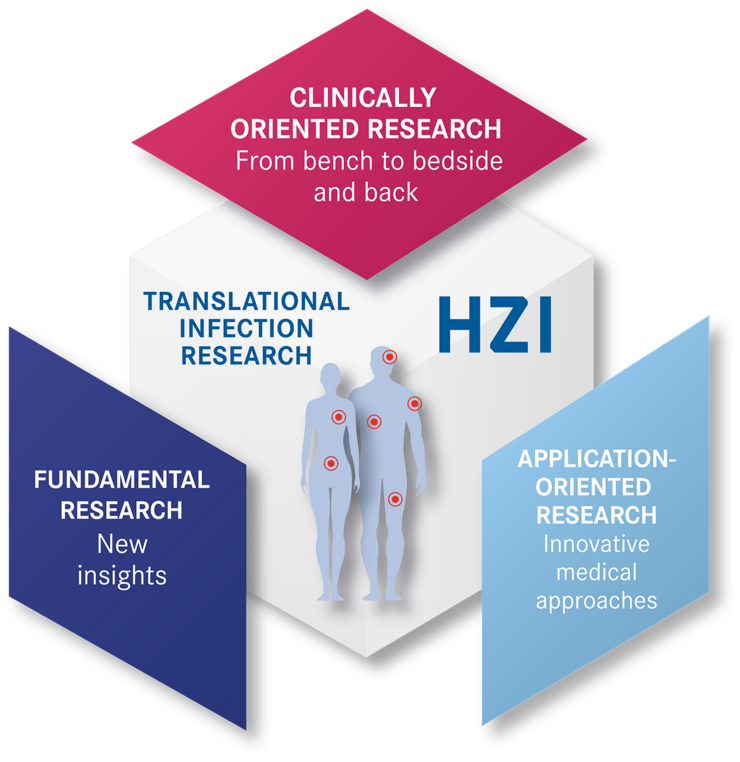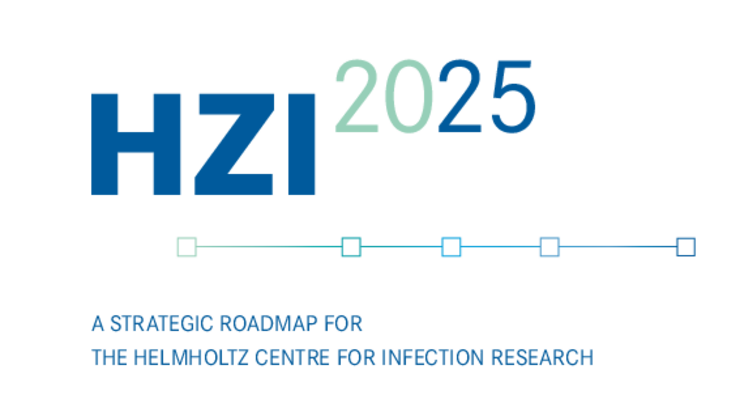Our Research
Infectious diseases caused by bacteria, viruses, parasites and fungi are responsible for more than a fifth of all human deaths annually. Despite improved hygiene and vaccinations, they still pose a global threat to human health. Even in industrialized countries, infections cause enormous social and economic damage through prolonged hospital stays and premature death. Unsurprisingly, infectious diseases make up the majority of the ten largest global health threats listed by the World Health Organization (WHO) in 2019.
HZI's Mission
The central mission of the Helmholtz Centre for Infection Research (HZI) is to address the infectious disease challenges of the 21st century. To make this possible, HZI has implemented its competitive programme “Infection Research”. The programme puts particular emphasis on the transfer of research results to application. In line with the mission of the Helmholtz Association, HZI pursues long-term and strategic infection research addressing one of the greatest health threats facing society.
HZI scientists promote clinical and pharmaceutical innovation by combining groundbreaking fundamental research with clinically oriented investigation and drug development. HZI's unique interdisciplinary approach enables development of novel, patient-tailored solutions for diagnosis, prevention, treatment as well as surveillance and control of infectious diseases. This will put HZI in a key position to help compensate for the withdrawal of the pharmaceutical industry from the development of anti-infectives, in particular antibiotics.
Translational Research - Achieving goals more efficiently through collaboration
Translation in infection research has many faces, but always one task: to close the gap between basic research and clinical application.
Results from basic research often do not find their way into clinical application - and thus ultimately to patients - or only very slowly. Many developments only reach a stage in the academic environment that the pharmaceutical industry still considers too risky to take up. At the HZI, however, the transfer of research results into medical and pharmaceutical applications plays a central role.
The staff unit "Innovation Management and Technology Transfer" therefore supports scientists in the sustainable transfer of technology to third parties, including small and medium-sized enterprises and industry.
In order to form a continuous chain from basic research findings to therapies and preventive measures, the HZI is involved in several translational networks:
- German Center for Infection Research (DZIF)
- Translational Alliance of Lower Saxony (TRAIN)
- Resist Cluster of Excellence
- Institute for Biomedical Translation (IBT)
The HZI does not provide care for patients itself, but works closely with clinical partner institutions. For example, the TWINCORE - Centre for Experimental and Clinical Infection Research and the Centre for Individualized Infection Medicine (CiiM) have been established in cooperation with the Hannover Medical School (MHH). Clinician scientists also have the opportunity to lead a research group at the HZI in parallel to their clinical work.
Roadmap HZI 2025
The Roadmap HZI 2025 is a strategic document which outlines the most important guidelines for the HZI’s development in the upcoming years.
It shows how the HZI, with its translational focus, will help to facilitate a faster and more targeted approach when it comes to fighting and preventing existing, emerging or recurring infectious diseases.
This clear positioning will allow the HZI to respond adeptly to the challenges that infectious diseases may present to society in the future.
-
Roadmap_enpdf (5.46 MB)
Good Scientific Practice
This independent committee, which has been installed according to the regulations and guidelines of the German Research Foundation (DFG), investigates all cases involving reasonable suspicion of scientific misconduct. It functions as a drop-in facility that can be approached, with confidentiality, by all members of staff at the centre.
The ombudsman group works independently and is not bound to directives from Management. In suspicious cases, they investigate comprehensively and have the right to confiscate and examine laboratory books, computers, data and records of every description.
Their investigative activities are concluded in the form of an extensive statement, in which the ombudsman group delivers an opinion and, if necessary, recommends appropriate measures.
This independent committee, which has been installed according to the regulations and guidelines of the German Research Foundation (DFG), investigates all cases involving reasonable suspicion of scientific misconduct. It functions as a drop-in facility that can be approached, with confidentiality, by all members of staff at the centre.
The ombudsman group works independently and is not bound to directives from Management. In suspicious cases, they investigate comprehensively and have the right to confiscate and examine laboratory books, computers, data and records of every description.
Their investigative activities are concluded in the form of an extensive statement, in which the ombudsman group delivers an opinion and, if necessary, recommends appropriate measures.
Election of the Ombudsman Group
Members of the ombudsman group are elected for five years by the scientific employees of the HZI. Both male and female employees are eligible who 1) are involved in research and development tasks and 2) possess either a university or polytechnic degree.
The ombudsman committee of the HZI consists of the following scientists:
- Dr Katharina Rox (speaker)
- Dr Berit Lange (deputy speaker)
- Prof Dr Ursula Bilitewski
- Dr Thomas Ebensen
- Prof Dr Dagmar Wirth
Principles of good scientific practice and regulations of the HZI
Several important principles for securing good scientific practice were formulated in 1998 by a commission of the German Research Foundation (DFG). This includes, for example, the commitment to retain primary data from research for ten years, in order to be able to execute retroactive and complete examinations.
As regards scientific specialist publications, all authors, in compliance with DFG recommendations, should jointly assume responsibility for correctness of the content. Inclusion of a neutral and independent contact facility, e.g. in the form of an ombudsman committee, is required in the DFG guidelines.
Based on the recommendations from the German Research Foundation (DFG), the HZI has provided binding regulations to make sure that legitimate scientific work is carried out.
-
Guidelines to ensure good scientific practicepdf (0.58 MB)
-
Policy on Financial Conflicts of Interest (FCOI)pdf (1.41 MB)





